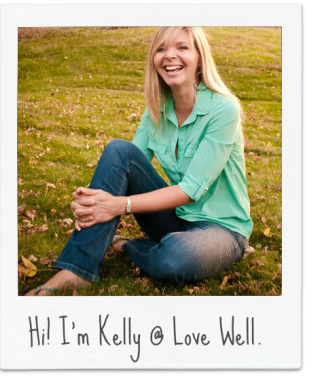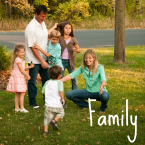
It wasn't until we had settled into our seats - tucking purses away, smooshing winter jackets into an extra chair, pulling the coffee tumblers out - that I noticed the family in front of us at church.
The parents were sandwiched between children, four in all, three girls and a boy. I was quickly drawn to the oldest girl holding her youngest sister, because the little one had glasses strapped over almond-shaped eyes characteristic of those with Down's. She plugged her ears with her fingers when the music started, the loud drums and the reverberating guitar quite too much for her nerves. Her older sister took it in stride and gently swayed to the music. Mom and Dad, a few seats down, held out their hands at various times, the universal sign for "Do you want me to take her?" The older girl, maybe 15, just smiled and kept swaying.
When the music finished, and we sat down, the parents dispersed paper and crayons for the middle kids and gently fit large headphones over the ears of the youngest girl, now carefully cradled in her father's lap. I kept watching them, even as I listened to the sermon, because who can look away from love?
And then I felt it, a quiet tugging in my marrow, a whisper in the space I've created recently for the Holy Spirit to speak. "They are doing it. A job well done."
"I know," my spirit replied, more with a smile than with words. "I see it."
"Tell them," the voice whispered back. "They need to hear it."
Straight away, my eyes filled with tears. I have no idea why, but that always happens to me when the Word speaks right from the center of my being. I am simultaneously terrified and exuberant. It is no small thing.
My first thought: "Yes! Yes, I should tell them. Who wouldn't want to be told something like that?"
Immediately followed by: "Oh my word, I can't tell people I don't even know I have a Word From the Lord for them. That's so ... Pentecostal." (At this point, the Holy Spirit smiled. I felt it.)
"Plus, what if they are doing all this as a front? What if they yelled at their kids all morning? What will the kids think if they hear me say, 'I feel like God wants me to tell you that you're doing a great job' and they think God condones something that isn't good? I shouldn't insert myself."
And so the wrestling match went, for 20 more minutes. By the end, I was pinned by the Spirit. (Which might be the real meaning of the Greek phrase "to be filled" we see in Ephesians 5.) If I say I want to hear from God, that I want to create margin in my heart, mind and schedule to listen and act, how dare I reply with pithy rationalizations that allow me to do nothing?
So it was, at the end of the service, that I stood tall and silent for a minute as the crowd around me gathered coats and voices, and then leaned over to the woman in front of me and said, "Are you new here today?"
She didn't hear me at first. (Of course not. That's how the Holy Spirit plays with me.)
I cleared my throat. "I'm sorry, are you new?" I asked with a louder, almost frantic tone. "I loved watching your family during church today."
At this, the mom turned and smiled. "Oh, we aren't new. We're just visiting today, for the baptism, to support some friends. We normally attend Bethlehem. I hope we didn't bother you too much with our chaos."
"No, not at all," I said. "In fact, I sat here and thought, 'you are doing such a good job.' And I think God wants me to tell you that. You are doing a good job."
She smiled, "Thank you. That's very kind."
And then the after-church rush pulled us apart and the conversation ended.
Did it matter to her? I don't know. I doubt encouragement ever goes unappreciated.
But I know it mattered to me, desperately. Because I want to hear God, and I think the Spirit talks most to those who have ears to hear.






















